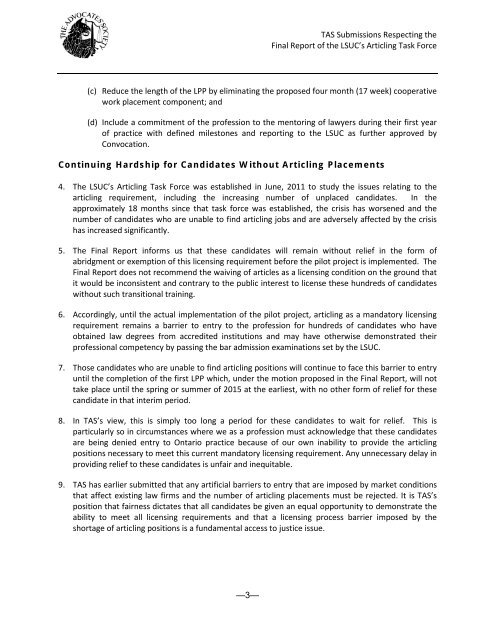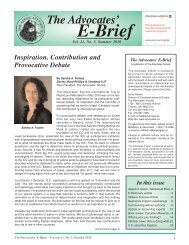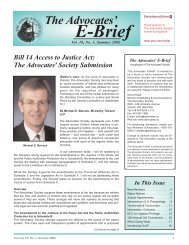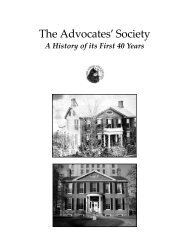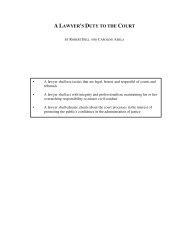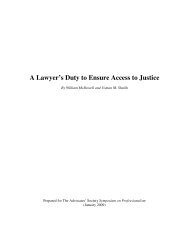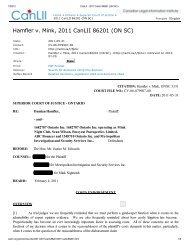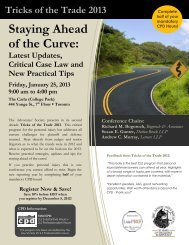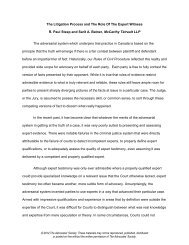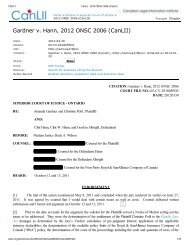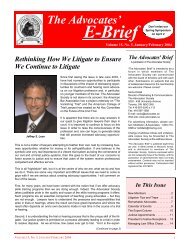Society's further submissions from November 2012 - The Advocates ...
Society's further submissions from November 2012 - The Advocates ...
Society's further submissions from November 2012 - The Advocates ...
Create successful ePaper yourself
Turn your PDF publications into a flip-book with our unique Google optimized e-Paper software.
TAS Submissions Respecting theFinal Report of the LSUC’s Articling Task Force(c) Reduce the length of the LPP by eliminating the proposed four month (17 week) cooperativework placement component; and(d) Include a commitment of the profession to the mentoring of lawyers during their first yearof practice with defined milestones and reporting to the LSUC as <strong>further</strong> approved byConvocation.Continuing Hardship for Candidates Without Articling Placements4. <strong>The</strong> LSUC’s Articling Task Force was established in June, 2011 to study the issues relating to thearticling requirement, including the increasing number of unplaced candidates. In theapproximately 18 months since that task force was established, the crisis has worsened and thenumber of candidates who are unable to find articling jobs and are adversely affected by the crisishas increased significantly.5. <strong>The</strong> Final Report informs us that these candidates will remain without relief in the form ofabridgment or exemption of this licensing requirement before the pilot project is implemented. <strong>The</strong>Final Report does not recommend the waiving of articles as a licensing condition on the ground thatit would be inconsistent and contrary to the public interest to license these hundreds of candidateswithout such transitional training.6. Accordingly, until the actual implementation of the pilot project, articling as a mandatory licensingrequirement remains a barrier to entry to the profession for hundreds of candidates who haveobtained law degrees <strong>from</strong> accredited institutions and may have otherwise demonstrated theirprofessional competency by passing the bar admission examinations set by the LSUC.7. Those candidates who are unable to find articling positions will continue to face this barrier to entryuntil the completion of the first LPP which, under the motion proposed in the Final Report, will nottake place until the spring or summer of 2015 at the earliest, with no other form of relief for thesecandidate in that interim period.8. In TAS’s view, this is simply too long a period for these candidates to wait for relief. This isparticularly so in circumstances where we as a profession must acknowledge that these candidatesare being denied entry to Ontario practice because of our own inability to provide the articlingpositions necessary to meet this current mandatory licensing requirement. Any unnecessary delay inproviding relief to these candidates is unfair and inequitable.9. TAS has earlier submitted that any artificial barriers to entry that are imposed by market conditionsthat affect existing law firms and the number of articling placements must be rejected. It is TAS’sposition that fairness dictates that all candidates be given an equal opportunity to demonstrate theability to meet all licensing requirements and that a licensing process barrier imposed by theshortage of articling positions is a fundamental access to justice issue.—3—


